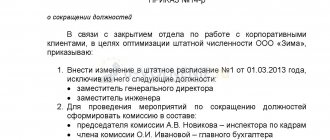What is a birth certificate and why is it needed?
A birth certificate is a document that is issued to a woman expecting the birth of a child and gives the right to receive medical services, namely service in the antenatal clinic (GC), delivery in any maternity hospital and observation during the postpartum period. The state encourages medical institutions to provide quality services, because the institution that the expectant mother chooses will receive additional funding under the birth certificate program.
What it looks like in practice:
- A pregnant woman registers with a residential complex.
- At 28 or 30 weeks, the LCD issues a birth certificate, which consists of 3 tear-off coupons.
- The first coupon remains in the housing complex for further payment for their services, the second coupon remains in the maternity hospital where the woman gave birth, the third coupon, both parts of it must be transferred to the children's clinic.
- Representatives of all these medical institutions themselves send the received coupons to the Social Insurance Fund, where they are checked. Then the FSS transfers the allocated money to the current accounts of medical institutions.
- The funds received are used in different shares for salaries of employees, for the purchase of new equipment, repairs, etc.
Accordingly, the more pregnant and postpartum women are accepted by medical institutions, the more funds will be transferred to them. This creates a healthy competitive environment, encouraging residential complexes, maternity hospitals and clinics to provide better medical services.
As part of the national project “Healthcare”, public hospitals, clinics and maternity hospitals will receive cash payments under a certificate in the amount of 12,000 rubles in 2021. Private clinics do not provide services under the certificate.
Documents required for issuance
To obtain an official document from the women's territorial consultation, you will not need a lot of paperwork and time.
You will need to provide:
- identification;
- health insurance policy;
- SNILS;
- an exchange card that is opened to a woman in a antenatal clinic.
Every woman can receive a financial document: not only adults, but also girls under the age of majority. Absence or presence of work is not taken into account.
If a pregnant woman does not have SNILS or compulsory medical insurance, then a certificate is issued in any case, with a note indicating the absence of certain papers.
Objectives and goals of the state program
The state program is a link in an important national project, which has two main goals:
- increase in birth rate and population;
- increasing life expectancy to 80 years by 2030.
The birth certificate program provides for the issuance of a document to all women who promptly applied to a medical institution for registration. There are 3 main tasks:
- Implementation of the right to independently choose a gynecology and maternity hospital in which observation and childbirth are planned.
- Formation of rivalry between medical institutions - antenatal clinics (GC), maternity hospitals, clinics for children.
- Improving the quality of medical services provided.
According to statistics, more than 90% of services for:
- management of pregnancy;
- childbirth and newborn care;
- medical examination of children under 1 year of age.
That is, it is the funds from the certificate that cover the costs of medical institutions for the purchase of new equipment, instruments, consumables, as well as bonuses to doctors’ salaries.
By introducing birth certificates into use, the Ministry of Health pursued a very specific goal: to financially interest doctors in providing quality care to pregnant women and those giving birth. This category of patients requires special treatment, which is not always available in Russian realities, especially in the field of free medicine. For as long as I can remember, pregnant women have always complained about the rudeness of doctors and medical staff, and doctors, in turn, pointed to hormonal changes, which in theory could be the cause of the complaints. The government's initiative is, of course, commendable, but everything is not as rosy as it looks in official reports. I personally received a birth certificate twice – in 2013 and in 2021, so I can judge this program sensibly. It turns out that in practice there is still quite a long way to go before achieving the goal set by the Ministry of Health. Let me start with the fact that in our city (I live in Yoshkar-Ola, Mari El) the choice of antenatal clinics is small, but there are still several of them. However, this does not prevent the administrations of these institutions from refusing to register those pregnant women who are not assigned to the clinic. I am assigned to the first city clinic, but there are no full-time gynecologists there.
I was sent to the fourth, which is located on the other side of the city. Having already registered there, I observed with my own eyes the situation, how a pregnant girl from the village wanted to be observed there, but she was refused, and in a rude manner, bringing her to tears. According to the program, medical institutions are compensated for the costs of pregnancy care. Personally, I didn’t feel any benefits from this. I had two out of three scheduled ultrasounds done for a fee (because “the machine is always busy”), and I bought vitamins with my own money. I was only provided with free potassium iodide and folic acid, which cost pennies.
We have only one maternity hospital. There is an old and a new building. There is no way to choose between them, since in the old one women with pathologies or colds give birth, while in the new one - everyone else. It turns out that in our city this program in practice does not provide any benefits to pregnant women and women in labor. The three coupons it contains are given to the antenatal clinic, maternity hospital and children's clinic. They are necessary for medical institutions to cover the costs of care for a woman in labor and her child. Although they are already obliged to do this. Previously there were no certificates, and with their introduction nothing has changed. There are just more papers, without which it will be difficult to get medical care even if you have compulsory medical insurance.
Guzel Chibisova
Is it possible to choose a maternity hospital
By law, a woman has the right to choose any maternity hospital she likes. A birth certificate helps realize this right, since the maternity hospital will receive money for this patient.
It must be borne in mind that as part of free medical care, in emergency cases, an ambulance can take a woman in labor to the nearest maternity hospital. If the expectant mother has indications for hospitalization in a specialized maternity hospital, then the woman will be taken there.
Emergency hotline for the population : we provide free consultations to pensioners, parents and beneficiaries of any category from legal experts over the phone.
What does the approved certificate form look like and who fills it out?
The form of the birth certificate is approved by the government of the Russian Federation. State and municipal medical institutions that have a license to provide the document have the right to issue and fill out a document. For visual distinction, the document is divided into multi-colored stripes. The certificate includes:
- Root. It is necessary to confirm the provision of a birth certificate to a woman. Some remain in the residential complex at the place where the pregnant woman is observed.
- Coupon 1. Used to pay for work performed during the period of pregnancy. This part is sent to the insurance company to transfer funds.
- Coupon 2. Necessary to pay for the birth process. Provided to the insurance company.
- Coupon 3. Has 2 parts. 3-1 is necessary to pay for the first six months of a newborn’s life. 3-2 gives the right to accrue money for the next 6 months. Sent to FSS.
An example of a birth certificate.
What does a birth certificate provide: what services and rights do mothers receive?
A birth certificate can be obtained by:
- Any girl who has Russian citizenship. Age and availability of work do not matter.
- Foreign women permanently residing in the territory of the Russian Federation, having a residence permit or temporary residence permit and a medical insurance policy.
The program entitles you to:
- Selecting a state residential complex in the city at the place of registration, any state maternity hospital.
- Receiving qualified medical care for mother and child during pregnancy, childbirth and for 1 year after them.
A birth certificate for any child is provided in the housing complex. The principle of obtaining a certificate for a second child and subsequent children is no different from receiving a document during the first pregnancy. Even if the birth of twins is expected, there will still be one form.
What assistance cannot be paid for?
A woman has the opportunity to keep coupons if she considers that the services were not provided in full or at an insufficient level of quality. The transfer of coupons is her right, not her obligation.
In most cases, the stated cost is not enough to cover all services provided. But within the framework of the main package, the government has determined this amount to be sufficient.
If special care is required due to identified complications, assistance is not included in the scope of the birth certificate. This will require additional reserves, although the medical institution cannot require the woman to pay for them.
Where and how can it be used, where is the birth certificate sent?
The face value of the certificate is 11,000 rubles, this amount includes:
- 4,000 rubles – a transfer for the work of the residential complex where the girl was registered. The coupon is given to 1 doctor in the residential complex.
- 6,000 rubles – payment for the work of the maternity hospital where the birth took place. Talon 2 remains.
- 2 x 1000 rubles – payment for the work of a children’s medical institution for every six months of monitoring a newborn. Coupon 3 remains with the pediatrician.
All necessary actions with the certificate will be carried out further by the medical institutions independently. The woman will only have part of the document confirming the provision of services.
Differences from exchange card
An exchange card is a document that indicates the personal data of a pregnant woman, test results, which doctors she was registered with for the entire period before giving birth, what diseases she has, and ultrasound tests.
In other words, this is an outpatient card. According to the data, the characteristics of a woman are taken into account when she comes to childbirth.
The certificate has one purpose - to pay the medical institution for the services provided. The exchange card is given much earlier, at 20 weeks of pregnancy, and the certificate at 30.
How does a birth certificate work?
The transfer of funds to a medical institution under a certificate is regulated by the Decree “On the Social Insurance Fund of the Russian Federation”.
The completed certificate is used to pay for the work of medical institutions that have an agreement with the Social Insurance Fund.
During pregnancy
Coupon 1 pays for the work of the residential complex where the girl was observed. If a pregnant woman has changed several clinics, the one where the woman was treated in the 3rd trimester will receive financial support. But only on the condition that the pregnant woman was observed in a medical institution for at least 12 weeks. Otherwise, no antenatal clinic will be able to qualify for funding under the Healthcare program. It is necessary to provide the new housing complex with all pregnancy statements received previously. If the girl was not observed anywhere and came to the residential complex before the birth itself, then the certificate will already be issued at the maternity hospital.
During the perinatal period
Coupon 2 is given to the medical organization where the woman received medical care during childbirth. Upon admission to the maternity hospital you must present:
- passport;
- exchange card;
- compulsory medical insurance policy;
- SNILS.
Otherwise, all the necessary documents can be brought by relatives. If a woman has a premature birth and a certificate has not been issued, then the maternity hospital staff can independently add her to the list of participants in the state “Health” program.
After the baby is born
The child must be observed in the clinic at the place of actual residence.
The woman is given the right to choose a children's clinic where the baby will be monitored. The certificate is valid only in institutions that have an agreement with the Social Insurance Fund. Coupon 3-1 pays for the first six months of dispensary observation. But additional expensive expenses, for example, for required operations, are not covered by this document. Coupon 3-2 is used to pay for the next 6 months of child care. If a woman chooses a private clinic, then she will not be able to cover the costs with a certificate.
How much do doctors get for a birth certificate?
Money from the certificate is not transferred personally to the doctor. They go to the organization's budget. Of these: 60% of the amount is for paying for the work of specialists, and 40% is for medicines and medical equipment.
I encountered the birth certificate system in 2021 during a long-awaited pregnancy. I was observed at the clinic where I worked as a neurologist at that time, so I can evaluate the effectiveness of the system from both sides. I’ll say right away that birth certificates are more needed by medical institutions than by patients. For example, when the Social Insurance Fund delayed payments on certificates, our clinic repeatedly discussed the question of whether it was possible to refuse to care for pregnant women altogether, since no one liked to wait for the transfer of money for several months after the service was provided.
As a result, both doctors and management agreed that such work was beneficial for the institution. There are a lot of pregnant women, part of the money from paying for the certificate goes to the doctor’s salary, and part to the hospital, so everyone is interested. The amount turns out to be decent, although there are delays in payments.
Meanwhile, the birth certificate does not provide any “special conditions” for a pregnant woman and a newborn baby. Let's look at the points:
1) Possibility to choose a maternity hospital and antenatal clinic. In many cases, it turns out to be more convenient to give birth in the hospital that you have chosen for yourself, rather than in the one that is closer to home. However, we read Article 21 of the Federal Law “On the Fundamentals of Protecting the Health of Citizens of the Russian Federation” No. 323-FZ, which states that a citizen has the right to choose a medical organization (without any generic certificate). It turns out that this is not an advantage at all, but standard practice. However, it must be taken into account that if the clinic does not work with birth certificates, but simply provides services to patients in the compulsory medical insurance system, then they will only be able to observe a pregnant woman for a fee or not at all (depending on the availability of a license). They can only provide assistance free of charge in the following cases: – emergency; – examination and treatment for concomitant diseases; – reluctance of the pregnant woman to register, irregular monitoring; – impossibility of obtaining a birth certificate for objective reasons (for example, lack of permanent registration).
As a rule, such hospitals simply do not undergo licensing for pregnancy care and refuse this service, since organizing a paid appointment in a public institution is quite complicated and often entails penalties. Therefore, in practice, paid care of pregnant women in public clinics is extremely rare. As a result, if you are not ready to pay for the services of a gynecologist and the necessary examinations, then the real choice is limited only to antenatal clinics operating according to a certificate system.
2) Free choice of children's clinic. Again we turn to the same law: parents, in any case, have the right to independently decide on the clinic where their child will be observed. Here, however, there is a nuance: if the child does not belong to the selected institution on a territorial basis, then you may be refused to examine him at home. They must be warned about this in advance and given the appropriate paper to sign. Not all parents agree to such conditions.
Free observation and examination of pregnant women and children. If you have a compulsory medical insurance policy, then you will receive the necessary diagnostic kit for free. And in some cases you have to pay even if you have a certificate. For example, I needed to get tested for thyroid hormones. This can be done for free only with a coupon, which you will have to wait 3-4 weeks. As a result, I went to a private laboratory and got tested for a fee. When a child developed allergies at the age of 5 months, all the tests prescribed by the doctor were also carried out for money.
3) Free assistance in the maternity hospital. You will not be charged for obstetric services even if you have never even seen a birth certificate. True, many people prefer to enter into a contract with the maternity hospital, but this is a personal matter for everyone. I gave birth without an individual contract and did not pay for anything, including pain relief during childbirth. Medicine provision for pregnant women. Using my own example, I can confirm that some medications are prescribed free of charge to pregnant women in antenatal clinics. Usually these are the cheapest preparations of calcium, iron, iodine, and folic acid. Personally, I received potassium iodide, calcium-D3 Nycomed and folic acid. And this is not because I was observed in the same clinic where I worked. I myself saw how they were also given to other patients.
Medicines are paid for from the birth certificate, if, of course, the head of the medical institution treats his duties conscientiously. Not all hospitals provide medications to pregnant women. In essence, this means that the funds intended for their purchase were used for other purposes. And it’s good if it’s for the real needs of the hospital, and not for the management’s pocket.
As a result, it turns out that for hospitals and maternity hospitals, a birth certificate is a big plus in the form of a serious cash bonus, but for a young mother and her child it is a completely neutral thing. Without him, she loses nothing, except perhaps cheap medicines.
Anna Velichkova
How to get a birth certificate
To do this, you should register with a budget antenatal clinic. It is important to do this before the 25th week of pregnancy, so that the woman is observed in the LCD for at least 12 weeks. Only in this case will she be given a certificate. Otherwise, if a woman was registered less often or was not registered at all, she will receive a certificate in the maternity hospital.
In the case when a woman wants to visit a private clinic, she needs to know about the following:
- It is important to ask whether the selected institution can issue a certificate.
- If the clinic cannot issue a document, then in the third trimester a woman can go to a regular housing complex and receive a certificate there. But you must have extracts from a paid institution on hand.
- You can get the paper at the maternity hospital. In this case, coupon 1 will be used.
The counterfoil and coupon 1 remain in the LCD. Coupon 2 is presented to the maternity hospital along with the exchange card. Coupon 3 (both parts) are sent to the children's clinic. The woman remains in her hands with part of the document confirming the receipt of all necessary services.
Documentation
Often women are interested in what documents are needed to obtain birth papers. No special papers are required here, all you need is:
- passports;
- compulsory medical insurance policy;
- SNILS.
The absence of the last two papers is not grounds for refusal to issue a document. But you will have to justify the reason for the absence. Therefore, a corresponding entry is placed in the certificate.
If you do not have a passport, you cannot be denied registration based on your age. If the expectant mother is a girl under 14 years old, she provides a birth certificate.
It’s better to collect the documentation in advance so you don’t have to rush around looking for the right piece of paper. When the papers are in order, there will be no problems with registration.
Instructions for filling out coupons to obtain a certificate
According to Appendix N2 of Order of the Ministry of Health and Social Development of the Russian Federation N 701 dated November 28, 2005, the instructions for filling out read:
- The certificate can only be completed by state and municipal medical institutions that specialize in pregnancy and childbirth. The institution must have a license to conduct activities in the specialization of obstetrics and gynecology.
- The document must be filled out in Russian using purple or blue ink.
- The full name of the pregnant woman is indicated on the counterfoil. Abbreviations are not allowed.
- In the line “registration address and place of residence” you should indicate data based on the stamp in the passport or document confirming registration.
- The “SNILS” line displays the number of the state pension insurance certificate.
- The line “Compulsory Medical Insurance Policy Number” displays the insurance policy data.
- The “date of issue” must contain the day, month, and year of the birth certificate.
Everything is secured with the signature of the pregnant woman in the appropriate line.
How to receive payment under a birth certificate
Payments under this document are provided only to medical institutions. A pregnant woman cannot pay with it in a private clinic. It is also impossible to receive money in your hands.
A certificate is also not required to receive benefits. Certificates from the registry office and other documents are needed.
There are separate promotions and programs from the FSS. For example, in Moscow you can buy some goods at a discount. And the online store “Babadu” provides pregnant women with a gift set based on the provision of a certificate. Any girl can receive such a gift. The promotion period is from the 7th month of pregnancy to the 3rd month of the newborn’s life.







![How to get a mortgage for new buildings in Sberbank in [year]](https://notarius-nn.ru/wp-content/uploads/kak-poluchit-ipoteku-na-novostrojki-v-sberbanke-v-year-godu-330x140.jpg)


